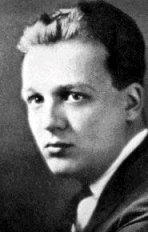
A Martian Odyssey
26 pages
Valley of Dreams
24 pages
[From the Best of Stanley G. Weinbaum]
Stanley G. Weinbaum
Ballentine 1974 [1934]
XXXII: A Martian Odyssey - Stanley G. Weinbaum
Synopsis: Jarvis and several companions are the first men on Mars. Jarvis has just returned from an unplanned forced march from where his atomic plane stopped working and recounting his tale.
Along the way, he met and befriended a birdlike alien named Tweel by saving it from a Martian predator. This Mars, while arid, is very densely populated often by thing which eat other things.
Although Jarvis cannot learn Martian, Tweel manages to learn a few words in English, using his tiny vocabulary to communicate with Jarvis. They trek across the Martian Desert, encountering telepathic monsters, silicon based animals and a nest of hive creatures, from whom Jarvis, in the spirit of exploration, steals a valuable glowing gem which may be the cure for cancer. Hijinks ensue but they survive, although Jarvis and Tweel are separated.
Jarvis and and Leroy, the French member of the crew, leave on a second exploratory jaunt, hoping to get some decent film footage to sell when they get back home. They head towards one of the poles, eventually discovering a vast city.
While exploring it, they encounter more of Tweel's people, including Tweel himself. Tweel takes them on a tour of the city. The city is ancient, at least 15,000 years old and Tweel people were at one time vastly greater in number and power: a mural shows their encounter with humans in Egypt, although how a race without chemical or atomic power got to Earth is un- answered. After a near fatal encounter with the dream beasts Jarvis met in the first story, they return to the ship.
Jarvis explains that Tweel's people are dying out through lack of energy, so he has given them the secret of atomic power.
Weinbaum died very young and ims all of his stories came out over an 18 month period. When you consider what the state of the art was when he was writing these stories, they are quite impressive [If you can find a copy of the Best of Stanley G. Weinbaum, Asimov goes on at some length about just how impressive Weinbaum was, showing the virtues of 'Campbellian' SF long before JWC was an editor.
I don't think anyone expected space travel to be as expensive as it is: Jarvis and his buddies expect to pay for their trip out of the film rights to the footage they shoot on Mars.
Weinbaum also expected certain forms of government to last longer than they did: Germany is an autocracy [One can only hope a resurgence of the old Germany monarchy rather than the rat-bastard in charge of Germany in '34]. This conservatism is reflected in other stories in the collection: the two main colonial powers on Venus are the USA and the UK. I imagine it would have been hard to believe that the UK would be beggared by another Great War in 5 years.
Tweel is one of the earliest attempts at a human-level ETI whose behavior is nonhuman. Tweel's a bit unusual in that he is brighter the humans he meets, able to figure out their languages while we can not figure out his. His is a fallen civilization and not the only one: the rat-beast seen in one scene is found on one of the Jovian moons and it's species shares -that- world with another fallen civilization, the loonies.
Not at all an accurate view of our time, but an entertaining one. It's a pity that our system is so empty and much more of one that Weinbaum had so little time in which to write.
